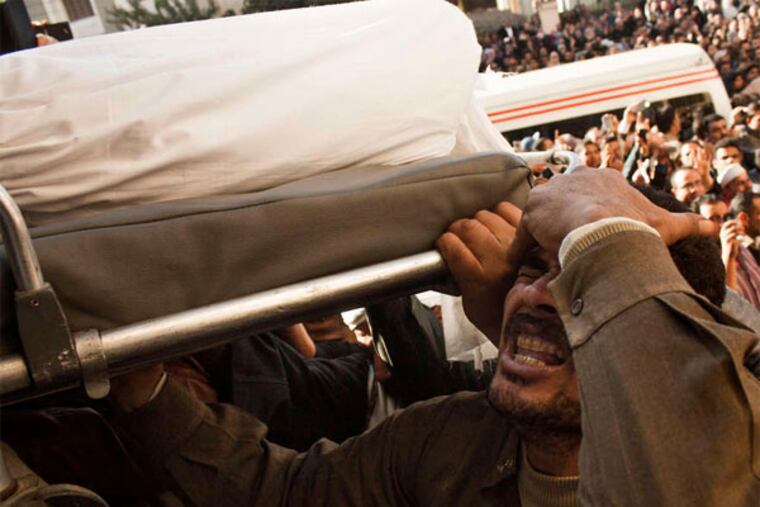Egypt declares Muslim Brotherhood a terrorist group
CAIRO - In a sharp escalation of the confrontation between Egypt's military-backed administration and the Muslim Brotherhood, the interim government Wednesday declared the Islamist movement a terrorist organization.

CAIRO - In a sharp escalation of the confrontation between Egypt's military-backed administration and the Muslim Brotherhood, the interim government Wednesday declared the Islamist movement a terrorist organization.
The declaration - a step that not even Hosni Mubarak took in his nearly 30-year rule - gives Egyptian authorities even broader authority to move against the Brotherhood, which has been the target of a harsh, sustained campaign by security forces and the judicial system.
It has been nearly six months since Islamist President Mohammed Morsi was booted out of office by the Egyptian army, after massive nationwide demonstrations demanding his removal. In the aftermath of the coup, the interim government has repeatedly declared its intention to set the country on a path to democracy; it has scheduled a constitutional referendum in January, which is to be followed by presidential and parliamentary elections in 2014.
The decision to declare the Brotherhood a terrorist group, announced in a cabinet statement, came one day after an audacious attack against a police headquarters in northern Egypt. The car bombing, in the Nile Delta town of Mansoura, killed at least 15 people, most of them police officers. On Wednesday, an al-Qaeda-inspired group active in the volatile Sinai Peninsula claimed responsibility for it.
Within hours of the attack, government officials cast blame on the Brotherhood, which has staged months of street protests demanding Morsi's reinstatement. The former president, together with nearly all his senior aides, is imprisoned and accused of a wide array of offenses, a number of which carry the death penalty. One of his three trials is to resume Jan. 8.
That the Mansoura bombing was apparently carried out by an unaffiliated Islamist organization did not prevent the government's latest move against the Brotherhood. The cabinet decision was read out by one of its members, Higher Education Minister Hossam Issa, who said the group had been formally designated a terrorist organization.
Brotherhood members dismissed the terror label, promising their near-daily protests against Morsi's ouster would continue.
"The protests are in the streets despite a law restricting them - and killings and prison sentences. All this has not changed the will of the people," said Ibrahim Elsayed, member of the Brotherhood's political group, the Freedom and Justice Party. "The decision has no value for us and is only worth the paper it is written on."
The Brotherhood, Morsi's principal base of support, already had been legally banned, with the government given authorization to seize its financial assets. Thousands of rank-and-file members of the organization have been jailed, and about 1,000 of Morsi's backers were killed in a mid-August crackdown in which Egyptian security forces broke up sprawling sit-in camps in the capital and elsewhere. Virtually the entire Brotherhood leadership is imprisoned.
The official move against the Brotherhood overshadowed a claim of responsibility for the Mansoura attack by Ansar Beit al-Maqdis, or Partisans of Jerusalem, an Islamist extremist group that until now had mainly been associated with attacks against security forces in the Sinai.
In its statement, the group appeared to warn that it considered police and soldiers anywhere in Egypt a target - together with those associated with the "apostate" military-backed interim government.
Calling the bombed security building in Mansoura "a venue for tyranny . . . against Islam and Muslims," the group repeated a call to members of the security forces to desert the ranks "if they want to hold fast to their lives and their religion."
The statement also identified by name the person who, it said, carried out the vehicle bombing, saying he "rode his steed to defend his religion." The Interior Ministry confirmed that the bombing had been a suicide attack.
Ansar has staged at least one major strike in Cairo - a suicide bombing in September that targeted Interior Minister Mohammed Ibrahim but failed to kill him. Other than that, its activities have been largely in the Sinai battleground.
The army tried unsuccessfully last week to capture at least two important figures in the group, but a raid by Egyptian troops in northern Sinai instead turned into a firefight that left two soldiers dead.
Rights lawyer Taher Abu-ElNasr said it was possible that a campaign of coming arrests would be based only on the basis of membership to the Brotherhood. He described it as an "escalating campaign" from both sides.
"This is a message that there is no room for negotiations," he said.